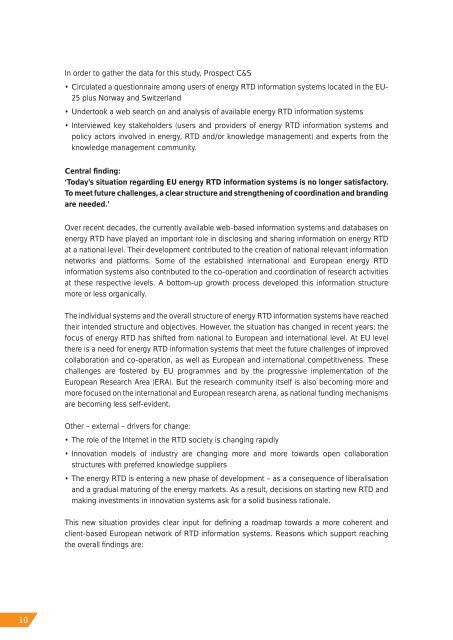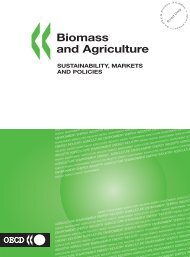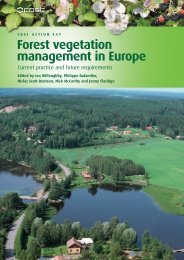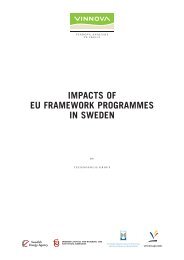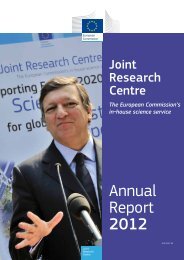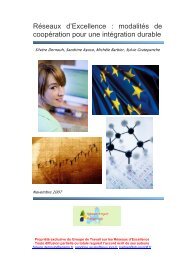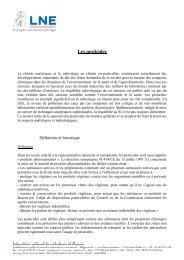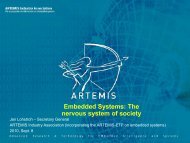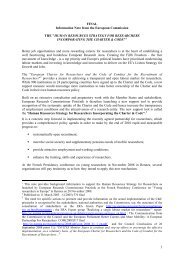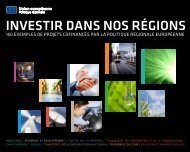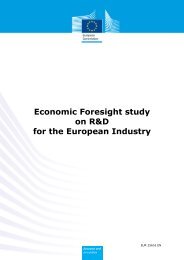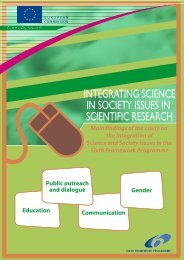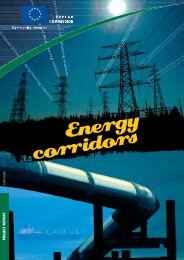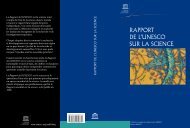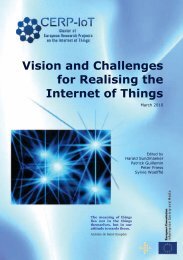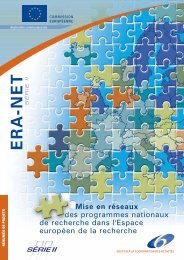Energy RTD Information Systems in the ERA - European ...
Energy RTD Information Systems in the ERA - European ...
Energy RTD Information Systems in the ERA - European ...
Create successful ePaper yourself
Turn your PDF publications into a flip-book with our unique Google optimized e-Paper software.
10<br />
In order to ga<strong>the</strong>r <strong>the</strong> data for this study, Prospect C&S<br />
• Circulated a questionnaire among users of energy <strong>RTD</strong> <strong>in</strong>formation systems located <strong>in</strong> <strong>the</strong> EU-<br />
25 plus Norway and Switzerland<br />
• Undertook a web search on and analysis of available energy <strong>RTD</strong> <strong>in</strong>formation systems<br />
• Interviewed key stakeholders (users and providers of energy <strong>RTD</strong> <strong>in</strong>formation systems and<br />
policy actors <strong>in</strong>volved <strong>in</strong> energy, <strong>RTD</strong> and/or knowledge management) and experts from <strong>the</strong><br />
knowledge management community.<br />
Central fi nd<strong>in</strong>g:<br />
‘Today’s situation regard<strong>in</strong>g EU energy <strong>RTD</strong> <strong>in</strong>formation systems is no longer satisfactory.<br />
To meet future challenges, a clear structure and streng<strong>the</strong>n<strong>in</strong>g of coord<strong>in</strong>ation and brand<strong>in</strong>g<br />
are needed.’<br />
Over recent decades, <strong>the</strong> currently available web-based <strong>in</strong>formation systems and databases on<br />
energy <strong>RTD</strong> have played an important role <strong>in</strong> disclos<strong>in</strong>g and shar<strong>in</strong>g <strong>in</strong>formation on energy <strong>RTD</strong><br />
at a national level. Their development contributed to <strong>the</strong> creation of national relevant <strong>in</strong>formation<br />
networks and platforms. Some of <strong>the</strong> established <strong>in</strong>ternational and <strong>European</strong> energy <strong>RTD</strong><br />
<strong>in</strong>formation systems also contributed to <strong>the</strong> co-operation and coord<strong>in</strong>ation of research activities<br />
at <strong>the</strong>se respective levels. A bottom-up growth process developed this <strong>in</strong>formation structure<br />
more or less organically.<br />
The <strong>in</strong>dividual systems and <strong>the</strong> overall structure of energy <strong>RTD</strong> <strong>in</strong>formation systems have reached<br />
<strong>the</strong>ir <strong>in</strong>tended structure and objectives. However, <strong>the</strong> situation has changed <strong>in</strong> recent years; <strong>the</strong><br />
focus of energy <strong>RTD</strong> has shifted from national to <strong>European</strong> and <strong>in</strong>ternational level. At EU level<br />
<strong>the</strong>re is a need for energy <strong>RTD</strong> <strong>in</strong>formation systems that meet <strong>the</strong> future challenges of improved<br />
collaboration and co-operation, as well as <strong>European</strong> and <strong>in</strong>ternational competitiveness. These<br />
challenges are fostered by EU programmes and by <strong>the</strong> progressive implementation of <strong>the</strong><br />
<strong>European</strong> Research Area (<strong>ERA</strong>). But <strong>the</strong> research community itself is also becom<strong>in</strong>g more and<br />
more focused on <strong>the</strong> <strong>in</strong>ternational and <strong>European</strong> research arena, as national fund<strong>in</strong>g mechanisms<br />
are becom<strong>in</strong>g less self-evident.<br />
O<strong>the</strong>r – external – drivers for change:<br />
• The role of <strong>the</strong> Internet <strong>in</strong> <strong>the</strong> <strong>RTD</strong> society is chang<strong>in</strong>g rapidly<br />
• Innovation models of <strong>in</strong>dustry are chang<strong>in</strong>g more and more towards open collaboration<br />
structures with preferred knowledge suppliers<br />
• The energy <strong>RTD</strong> is enter<strong>in</strong>g a new phase of development – as a consequence of liberalisation<br />
and a gradual matur<strong>in</strong>g of <strong>the</strong> energy markets. As a result, decisions on start<strong>in</strong>g new <strong>RTD</strong> and<br />
mak<strong>in</strong>g <strong>in</strong>vestments <strong>in</strong> <strong>in</strong>novation systems ask for a solid bus<strong>in</strong>ess rationale.<br />
This new situation provides clear <strong>in</strong>put for defi n<strong>in</strong>g a roadmap towards a more coherent and<br />
client-based <strong>European</strong> network of <strong>RTD</strong> <strong>in</strong>formation systems. Reasons which support reach<strong>in</strong>g<br />
<strong>the</strong> overall fi nd<strong>in</strong>gs are:


